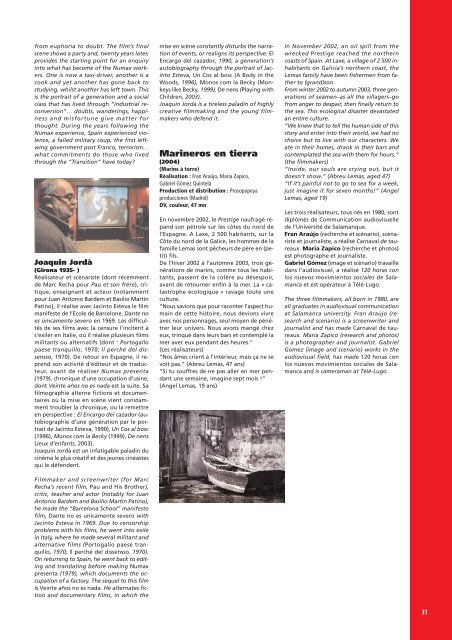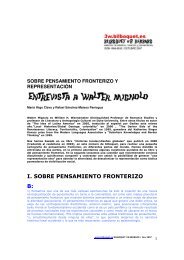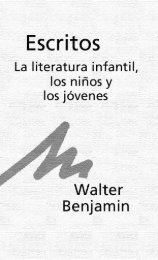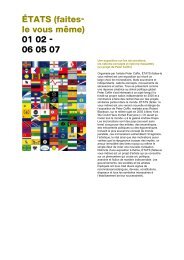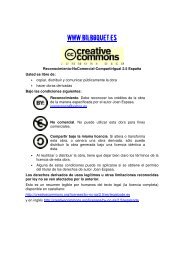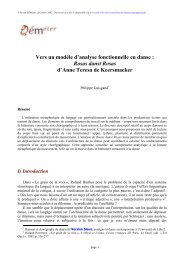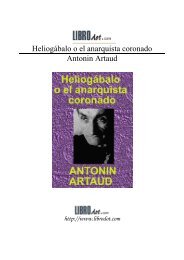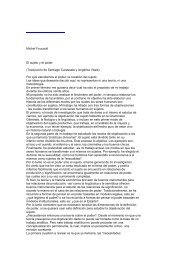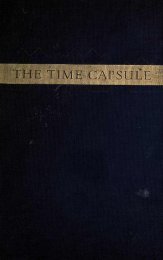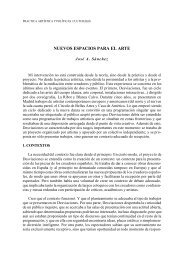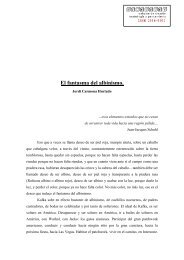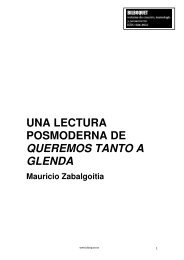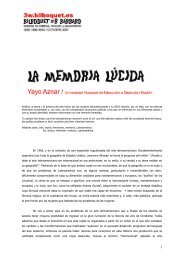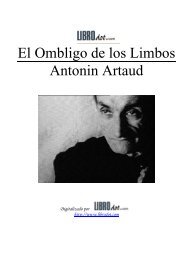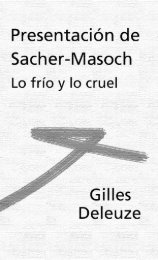De Salamancaa ninguna parte(2001)(De Salamanque à nulle partFrom Salamanca to Nowhere)Réalisateur : Chema de la PeñaScénario : Chema de la Peña, Oscar de JulianImage : Rafael RocheSon : Martínez de San MateoMontage : Antonio LaraProduction et distribution : ArtimañaProducciones (Madrid)Avec : Basilio Martín Patino, José Luis Borau,Manuel Summers, Miguel Picazo, Carlos Saura,Garcia Escudero, Mario Camus, Emilio GutierrezCaba, Aurora Bautista, Julio Diamante, Elsa Baeza35 mm, coul et n. et bl., 80 mnEn 1955, le jeune Juan Antonio Bardem s’exclame: «Le cinéma espagnol est politiquementinefficace, socialement menteur, intellectuellementmédiocre, esthétiquementnul et industriellement rachitique.» LesConversations de Salamanque de 1955 marquentle début du «Nuevo Cine Español».Archives des actualités officielles, entretienset extraits de films racontent une «générationperdue» de jeunes cinéastes qui revendiquaientl’expression au cinéma de la réalitésociale et humaine de leur pays, etluttaient pour une école de cinéma libre etinventive, contre les caciques franquistes.Moment enthousiaste de renouvellement desécritures, le Nuevo Cine se perdra au milieudes années 60, entre renoncements et repliementssur la clandestinité. Il laisse cependantdes œuvres majeures, du Nueve cartas aBerta (Neuf lettres à Berta) de Patino à LosGolfos (Les Voyous, 1962) de Carlos Saura.In 1955, the young Juan Antonio Bardemexclaimed: “Spanish cinema is politically inefficient,socially untruthful, intellectuallymediocre, aesthetically lousy and industriallyrickety” at the 1955 Salamanca Conference.Official news archives, interviews and film excerptstell of a “lost generation” of youngfilmmakers, who demand that cinema expressreality and who struggle for a free and innovativefilm movement, against the Franquistcaciques. The New Spanish Cinema disappearedin the mid-60s, lost betweenrenunciation and retreat into clandestinity.Yet, it left behind some major films, includingPatino’s Nueve cartas a Berta and Carlos Saura’sLos Golfos (1962).Chema de la Peña(Salamanque, 1964 - )Entraîné vers le cinéma par les Rencontres deValence de 1989 (co-organisées par BasilioMartin Patino) et après avoir terminé à Madriddes études d’économie, il réalise descourts métrages (El negocio es el negocio,1993, Lourdes de segunda mano, 1995) etcrée sa société de production Artimaña, avantde passer au long métrage (Shecky Carmine,1999, Isi + Disi amor a lo bestia, 2004).Drawn to cinema by the 1989 ValenciaConference (organised with Basilio MartínPatino). After finishing his studies in economicsat Madrid, he made the short films (Elnegocio es el negocio, 1993, Lourdes de segundamano, 1995) and set up his productioncompany, Artimaña, before making featurefilms (Shecky Carmine, 1999, Isi + Disiamor a lo bestia, 2004).200 km(2003)Réalisation collective, image et son :Groupe Discusión 14Tània Balló, Nora B.González, Núria Campabadal,Ricard Carbonell, Roger Comella, Aymar del Amo,Marco Iglesias, David Linares, Oscar M.Chamorro,Elisa Martínez, Itati Moyano, Cristina Pérez,Sandra Ruesga, Ruth Somalo.Montage : Sérgio DiesProduction et distribution : QuimelcaVidéo transférée 35 mm, couleur, 100 mnLes travailleurs de SINTEL (une des filialesimportantes de Telefonica à l’époque desprivatisations) avaient, en 2001, occupél’avenue principale de Madrid et monté un« Campement de l’espoir ». Au bout de sixmois, les 1 800 travailleurs avaient obtenudu gouvernement Aznar et de Telefonical’engagement d’être reclassés et réemployés.Deux ans plus tard, les promesses n’ont pasété tenues. Plus de 1 500 travailleurs, accompagnésde leurs familles entament alorsune « marche de la dignité » de 8 jours, àpartir de 6 lieux d’Espagne, pour se retrouverà Madrid le 1 er mai, et exiger une solutionà leur situation, malgré les renoncementssyndicaux et l’indifférence gouvernementale.Un groupe de 14 étudiants de cinéma etjeunes réalisateurs se constitue pour les accompagneret documenter la marche et lalutte : de routes en autoroutes, de villageen village, de campements en hébergementssolidaires, les ouvriers parlent, discutent,rient ou se découragent. La colère et l’exigencede dignité ne faiblissent pas.In 2001, the workers at SINTEL (one of Telefónica’slarge subsidiaries during the periodof privatisation) occupied Madrid’s mainavenue and set up a “Camp of Hope”. Aftersix months, the 1,800 workers obtained thepromise of a re-employment package fromAznar’s government and Telefónica.Two years later, these promises were notkept. More than 1,500 workers, along withtheir families, began an eight-day “Marchfor dignity” starting from six different pointsin Spain. The march was to converge in Madridon May 1 st with demands for a solutionto their situation, despite their abandon bythe trades unions and the government’s indifference.Fourteen film students and young filmmakersjoined together to accompany themand document the march and the struggle:along roads and motorways, from village tovillage, from camp sites to accommodationprovided by supporters, the workers talk,discuss, laugh or become discouraged. Yettheir anger and demand for dignity do notfade.Veinte años no es nada(2004)(Vingt ans, ce n’est rien)Réalisateur : Joaquin JordàScénario : Joaquin Jordà, Laia ManresaImage : Carles GusiSon : Dani Fontrodona, Jordi BonetMontage : Nuria EsquerraProduction : Antoni Camin pour Ovideo TV,avec Canal+, TVC, ICIC, ICAAVidéo transférée 35 mm,1:85, coul. et n. et bl., 117 mnA la fin des années 70, l’Espagne traverse lesdifficiles années de la reconversion industrielle,sociale et politique. Les ouvriers peuventenfin revendiquer droits et réformes.En 1979, ceux de l’entreprise d’électroménagerNumax occupent et autogèrent leurusine. Joaquin Jordà filme leur expérience(Numax presenta…) et raconte le passage del’euphorie au doute. La dernière scène dufilm est une fête. C’est le point de départ, 25ans plus tard, d’une enquête sur le devenirdes Numax. L’un d’eux est devenu chauffeurde taxi, l’autre cuisinier, l’une a repris sesétudes, l’autre quitté la ville. Portrait d’unegénération (et d’une classe) qui a vécu la « reconversionindustrielle ». … doutes, errances,bonheurs et malheurs suscitent la réflexion.Dans les années qui ont suivi la fin de l’expérienceNumax, l’Espagne a vécu la violence,une tentative de coup d’état militaire, unpremier gouvernement de gauche d’après lefranquisme, le terrorisme… vers quels engagementsse tournent aujourd’hui ceux quiont traversé la «Transition» ?In the late 70s, Spain went through difficultyears of industrial, social and political reconversion.Workers were at last able toclaim their rights and reformsIn 1979, the employees of Numax, a companymanufacturing electrical appliances,occupied and managed their factory.Joaquin Jordà filmed their experience (Numaxpresenta…) and told how they went76
from euphoria to doubt. The film’s finalscene shows a party and, twenty years later,provides the starting point for an enquiryinto what has become of the Numax workers.One is now a taxi-driver, another is acook and yet another has gone back tostudying, whilst another has left town. Thisis the portrait of a generation and a socialclass that has lived through “industrial reconversion”…doubts, wanderings, happinessand misfortune give matter forthought. During the years following theNumax experience, Spain experienced violence,a failed military coup, the first leftwinggovernment post Franco, terrorism…what commitments do those who livedthrough the “Transition” have today?Joaquin Jordà(Girona 1935- )Réalisateur et scénariste (dont récemmentde Marc Recha pour Pau et son frère), critique,enseignant et acteur (notammentpour Juan Antonio Bardem et Basilio MartínPatino), il réalise avec Jacinto Esteva le filmmanifeste de l’Ecole de Barcelone, Dante noes únicamente severo en 1969. Les difficultésde ses films avec la censure l’incitent às’exiler en Italie, où il réalise plusieurs filmsmilitants ou alternatifs (dont : Portogallopaese tranquillo, 1970; Il perché del dissensso,1970). De retour en Espagne, il reprendson activité d’éditeur et de traducteur,avant de réaliser Numax presenta(1979), chronique d’une occupation d’usine,dont Veinte años no es nada est la suite. Safilmographie alterne fictions et documentairesoù la mise en scène vient constammenttroubler la chronique, ou la remettreen perspective : El Encargo del cazador (autobiographied’une génération par le portraitde Jacinto Esteva, 1990), Un Cos al bosc(1996), Monos com la Becky (1999), De nens(Jeux d’enfants, 2003).Joaquin Jordà est un infatigable paladin ducinéma le plus créatif et des jeunes cinéastesqui le défendent.Filmmaker and screenwriter (for MarcRecha’s recent film, Pau and His Brother),critic, teacher and actor (notably for JuanAntonio Bardem and Basilio Martin Patino),he made the “Barcelona School” manifestofilm, Dante no es unicamente severo withJacinto Esteva in 1969. Due to censorshipproblems with his films, he went into exilein Italy, where he made several militant andalternative films (Portogallo paese tranquillo,1970; Il perché del dissensso, 1970).On returning to Spain, he went back to editingand translating before making Numaxpresenta (1979), which documents the occupationof a factory. The sequel to this filmis Veinte años no es nada. He alternates fictionand documentary films, in which themise en scène constantly disturbs the narrationof events, or realigns its perspective: ElEncargo del cazador, 1990, a generation’sautobiography through the portrait of JacintoEsteva, Un Cos al bosc (A Body in theWoods, 1996), Monos com la Becky (Monkeyslike Becky, 1999), De nens (Playing withChildren, 2003).Joaquin Jordà is a tireless paladin of highlycreative filmmaking and the young filmmakerswho defend it.Marineros en tierra(2004)(Marins à terre)Réalisation : Fran Araújo, Maria Zapico,Gabriel Gómez QuintelaProduction et distribution : Prosopopeyaproducciones (Madrid)DV, couleur, 47 mnEn novembre 2002, le Prestige naufragé répandson pétrole sur les côtes du nord del’Espagne. A Laxe, 2 500 habitants, sur laCôte du nord de la Galice, les hommes de lafamille Lemas sont pêcheurs de père en (petit)fils.De l’hiver 2002 à l’automne 2003, trois générationsde marins, comme tous les habitants,passent de la colère au désespoir,avant de retourner enfin à la mer. La « <strong>cata</strong>stropheécologique » ravage toute uneculture.“Nous savions que pour raconter l’aspect humainde cette histoire, nous devions vivreavec nos personnages, seul moyen de pénétrerleur univers. Nous avons mangé chezeux, trinqué dans leurs bars et contemplé lamer avec eux pendant des heures.”(Les réalisateurs)“Nos âmes crient à l’intérieur, mais ça ne sevoit pas.” (Abreu Lemas, 47 ans)“Si tu souffres de ne pas aller en mer pendantune semaine, imagine sept mois !”(Angel Lemas, 19 ans)In November 2002, an oil spill from thewrecked Prestige reached the northerncoasts of Spain. At Laxe, a village of 2 500 inhabitantson Galicia’s northern coast, theLemas family have been fishermen from fatherto (grand)son.From winter 2002 to autumn 2003, three generationsof seamen–as all the villagers–gofrom anger to despair, then finally return tothe sea. This ecological disaster devastatedan entire culture.“We knew that to tell the human side of thisstory and enter into their world, we had nochoice but to live with our characters. Weate in their homes, drank in their bars andcontemplated the sea with them for hours.”(the filmmakers)“Inside, our souls are crying out, but itdoesn’t show.” (Abreu Lemas, aged 47)“If it’s painful not to go to sea for a week,just imagine it for seven months!” (AngelLemas, aged 19)Les trois réalisateurs, tous nés en 1980, sontdiplômés de Communication audiovisuellede l’Université de Salamanque.Fran Araújo (recherche et scénario), scénaristeet journaliste, a réalisé Carnaval de taureaux.Maria Zapico (recherche et photos)est photographe et journaliste.Gabriel Gómez (image et scénario) travailledans l’audiovisuel, a réalisé 120 horas conlos nuevos movimientos sociales de Salamancaet est opérateur à Télé-Lugo.The three filmmakers, all born in 1980, areall graduates in audiovisual communicationat Salamanca university. Fran Araújo (researchand scenario) is a screenwriter andjournalist and has made Carnaval de taureaux.Maria Zapico (research and photos)is a photographer and journalist. GabrielGomez (image and scenario) works in theaudiovisual field, has made 120 horas conlos nuevos movimientos sociales de Salamancaand is cameraman at Télé-Lugo.77


